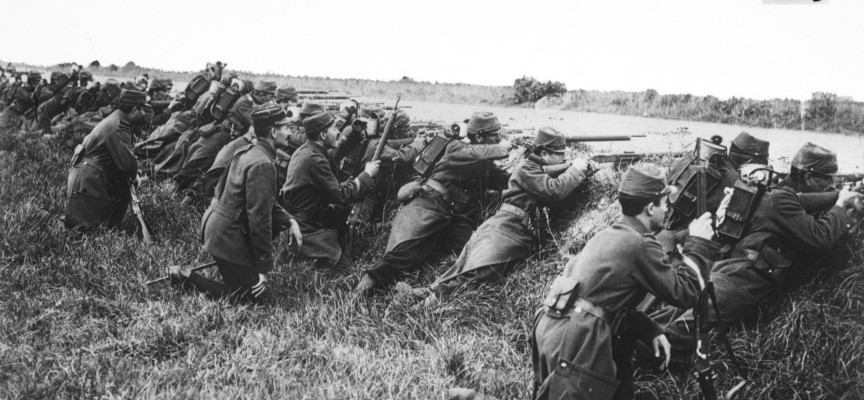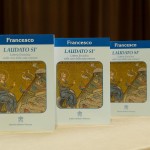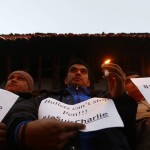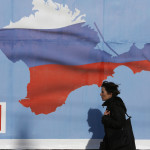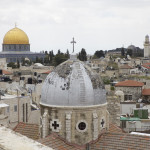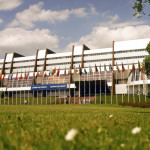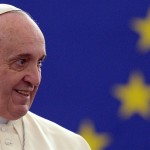It was Pope Francis who found the right words. He cited two of his predecessors: Benedict XV, who in 1917 described the war as a “useless slaughter”, and (although without mentioning his name) Pius XII, who exclaimed with passion in a radio broadcast speech a few days before the outbreak of World War II, after the German invasion of Poland , August 24, 1939: “Everything is lost with war, nothing is lost with peace.” Pope Francis expressed the hope that today the mistakes of the past are not repeated and that the lessons of history are taken into consideration in order to ensure the victory of the cause of peace through a “patient and courageous dialogue”.
Christians, but not only them, all people of good will, are particularly challenged in this context. Too often today regarding the various areas of crisis, again war is considered possible as a “last resort.” Those who think otherwise are ridiculed as “pacifists”.
Then we should recall that the conservative thinker and theologian Alfredo Ottaviani – then Cardinal – already in 1947 formulated with clarity: “Bellum omnino interdicendum esse”: every war is to be banned – even the so-called war of defence. Before saying this, Mgr. Ottaviani had visited some areas of Southern Italy which had been devastated by World War II and he had seen with his own eyes what war inflicts.
Even without having recourse to nuclear weapons, modern war techniques (at least since the time of the North-American Civil War of 1861-1865) are the cause of terrible massacres of civilians. And no less terrible is their impact on the soldiers, many of them still teenagers (some languages express this concept by describing them as “boys” or “little soldiers”). But we should not expect that in these pre-technological times war would have been different and more bearable.
The national Austrian poet Franz Grillparzer (1791-1872) in the last chapter of his play “King Ottokar’s Fortune and End” formulated a king’s self-accusation which radically expressed the perversion of killing in war: “No royal palace could be compared with the human body! But I killed thousands of them. Out of an act of folly, out of a sheer drive, just as you throw the garbage out of the door. And among them no one who had not been caressed by his mother after childbirth, no one who had not been blessed by his father and raised with pride and treasured for many years. When he got hurt on his finger’s skin they rushed to bandage the wound and monitored it until it was finally cured. And it was only one finger, the skin of the finger! But I, I have exterminated dozens of them and I have pierced their warm bodies with my sword.”
In the “seminal catastrophe” of the First World War all happened a million times, then overcome by the horror of World War II, and then again and again. The only worthy commemoration of July 28, 1914, remains the passionate exclamation of Pope Francis in the Angelus prayer on Sunday, July 27: “No more war! No more war!”.
Die richtigen Worte hat Papst Franziskus gefunden. Er zitierte zwei seiner Vorgänger: Benedikt XV., der den Krieg 1917 als „unnützes Blutbad“ bezeichnete und (ohne ihn beim Namen zu nennen) Pius XII., der wenige Tage vor dem Ausbruch des Zweiten Weltkriegs durch den deutschen Überfall auf Polen am 24. August 1939 in einer Radioansprache leidenschaftlich ausrief: „Alles ist verloren mit dem Krieg, nichts ist verloren mit dem Frieden“. Papst Franziskus hat die Hoffnung ausgesprochen, dass heute nicht die Fehler der Vergangenheit wiederholt werden, dass die Lehren der Geschichte vor Augen gehalten werden, um der Sache des Friedens durch einen „geduldigen und mutigen Dialog“ die Oberhand zu sichern.
Die Christen, aber nicht nur sie, alle Menschen guten Willens, sind in diesem Zusammenhang besonders gefordert. Viel zu oft ist heute im Hinblick auf die diversen Krisenherde wieder davon die Rede, dass Krieg als „ultima ratio“ möglich sein müsse. Wer anders denkt, wird als „Pazifist“ belächelt.
Da muss daran erinnert werden, dass ein so konservativer theologischer Denker wie Alfredo Ottaviani – der spätere Kardinal – bereits 1947 mit Entschiedenheit formulierte „Bellum omnino interdicendum esse“, jeglicher Krieg ist zu untersagen, auch der sogenannte Verteidigungskrieg. Ottaviani hatte zuvor die vom Zweiten Weltkrieg verheerten Gebiete Süditaliens besucht und dort mit eigenen Augen gesehen, was Krieg anrichtet.
Selbst ohne Nuklearwaffeneinsatz verursacht der moderne technische Großkrieg (wie er spätestens seit dem amerikanischen Bürgerkrieg von 1861/65 üblich ist) schreckliche Blutbäder unter der Zivilbevölkerung. Und nicht minder schrecklich sind die Auswirkungen auf die Soldaten, die zumeist halbe Kinder sind (manche Sprachen bringen das gut zum Ausdruck, wenn etwa von den Soldaten als „ragazzi“ oder „soldatini“ die Rede ist). Wobei man sich keinen Illusionen hingeben sollte, dass es in vortechnischen Zeiten anders – und Krieg damit „erträglicher“ – gewesen wäre.
Der österreichische Nationaldichter Franz Grillparzer (1791-1872) hat in seinem Drama „König Ottokars Glück und Ende“ im letzten Kapitel eine Selbstanklage des Königs formuliert, die drastisch die Perversion des Tötens im Krieg zum Ausdruck bringt:
„Kein Königsschloss mag sich vergleichen mit dem Menschenleib! Ich aber hab sie hin zu Tausenden geworfen. Um einer Torheit, eines Einfalls willen, wie man den Kehricht schüttet vor die Tür. Und keiner war von den Gebliebnen allen, den seine Mutter nicht, als sie mit Schmerz geboren, mit Lust gedrückt an ihre Nährerbrust, der Vater nicht als seinen Stolz gesegnet und aufgezogen, jahrelang gehütet. Wenn er am Finger sich verletzt die Haut, da liefen sie herbei und banden’s ein und sahen zu, bis endlich es geheilt. Und ‘s war ein Finger nur, die Haut am Finger! Ich aber hab sie schockweis hingeschleudert und starrem Eisen einen Weg gebahnt in ihren warmen Leib“.
In der „Urkatastrophe“ des Ersten Weltkriegs ist es millionenfach geschehen, dann noch übertroffen von den Gräueln des Zweiten Weltkriegs und seither immer wieder. Das einzige würdige 100-Jahr-Gedenken des 28. Juli 1914 bleibt der leidenschaftliche Ausruf von Papst Franziskus beim Angelus-Gebet: „Niemals Krieg! Niemals Krieg!“.
Una giornata di profondo lutto
È stata una giornata di profondo lutto, questo 28 luglio 2014 – centesimo anniversario della dichiarazione di guerra austro-ungarica contro la Serbia, accendendo cosi la Prima guerra mondiale, la “catastrofe seminale” del Novecento. Negli ultimi mesi, molto è stato scritto e discusso su questo 28 luglio 1914 (ben poco circa la guerra dei “poteri centrali” in Serbia, la quale con 1,1 milioni di morti – militari e civili – dal punto di vista percentuale ha avuto le perdite più alte della Prima guerra mondiale).
Le parole giuste le ha trovate Papa Francesco. Ha citato due dei suoi predecessori: Benedetto XV, che ha descritto la guerra nel 1917 come “inutile strage”, e (pur non chiamandolo per nome) Pio XII, che pochi giorni prima dello scoppio della Seconda guerra mondiale con l’invasione tedesca della Polonia, il 24 agosto 1939, in un discorso radiofonico esclamò con passione: “Tutto è perduto con la guerra, niente è perduto con la pace.” Papa Francesco ha espresso la speranza che gli errori del passato non vengano ripetuti e che le lezioni della storia siano tenute in considerazione al fine di garantire il sopravvento alla causa della pace tramite un “dialogo paziente e coraggioso”.
I cristiani, ma non solo loro, tutti gli uomini di buona volontà sono particolarmente sfidati in questo contesto. Troppo spesso, per quanto riguarda le varie zone di crisi, di nuovo si ritiene possibile la guerra come “ultima ratio”. Chi la pensa diversamente viene ridicolizzato come un “pacifista”.
Allora bisogna ricordare che un pensatore e teologo conservatore come Alfredo Ottaviani – poi cardinale – già nel 1947 formulò con chiarezza: “Bellum omnino interdicendum esse”, ogni guerra è da vietare, anche la cosiddetta guerra di difesa. Prima Ottaviani aveva visitato le zone dell’Italia meridionale devastate dalla Seconda guerra mondiale e aveva visto con i suoi occhi ciò che la guerra infligge.
Anche senza l’uso di armi nucleari la moderna guerra tecnica (almeno dai tempi della guerra civile americana del 1861-1865) causa terribili stragi di civili. E non meno terribile è l’impatto sui soldati, molti dei quali adolescenti (alcune lingue esprimono bene questo concetto descrivendo i soldati come “ragazzi” o “soldatini”). Ma non ci si deve illudere che in tempi pre-tecnologici la guerra sarebbe stata diversa e più sopportabile.
Il poeta nazionale austriaco Franz Grillparzer (1791-1872), nell’ultimo capitolo del suo dramma “Fortuna e fine di re Ottokar”, formula un’auto-accusa del re che esprime in modo drastico la perversione dell’uccidere in guerra: “Non c’è palazzo reale che si potrebbe confrontare con il corpo umano! Ma io li ho fatti fuori a migliaia. Per una follia, per un impulso come si versa la spazzatura fuori dalla porta. E tra di loro nessuno che non sarebbe stato accarezzato dalla sua madre dopo il parto, nessuno che non sarebbe stato benedetto da suo padre con orgoglio e cresciuto e custodito per molti anni. Quando si era fatto male sulla pelle del dito accorrevano e bendavano la ferita e guardavano finche era finalmente guarito. Ed era solo un dito, la pelle sul dito! Ma io li ho sterminati a decine e ho aperto al ferro rigido una strada nel loro corpo caldo “.
Nella “catastrofe seminale” della prima guerra mondiale tutto è successo milioni di volte, poi superato dagli orrori della Seconda guerra mondiale e da allora sempre di nuovo. L’unica degna commemorazione del 28 luglio 1914 rimane l’esclamazione appassionata di Papa Francesco nella preghiera dell’Angelus di domenica 27 luglio: “Mai la guerra! Mai la guerra!”.
Erich Leitenberger
Spokesman "Pro Oriente" Foundation, Austria
Latest posts by Erich Leitenberger (see all)
- A special journey - 24 novembre 2014
- A day of deep mourning - 29 luglio 2014
- Some fresh air for Europe - 17 giugno 2014

